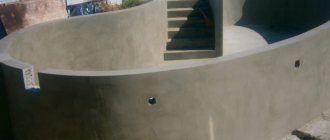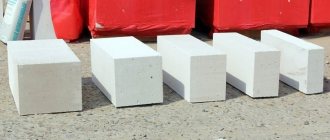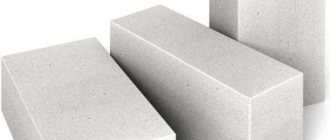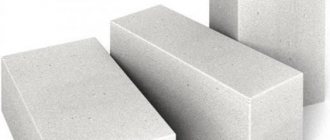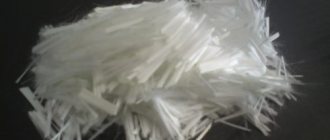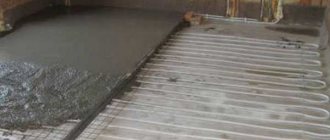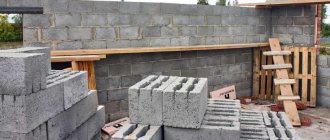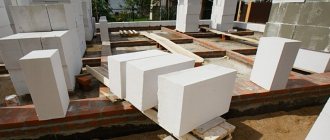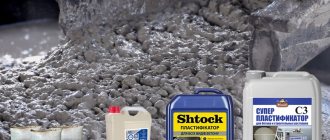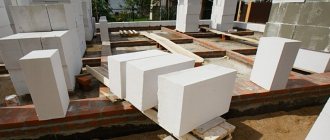Beton-House.com
Website about concrete: construction, characteristics, design. We combine the experience of professionals and private craftsmen in one place
Aeroc brand products
Many years of experience in the successful production of autoclaved aerated concrete products, high-tech equipment and impeccable product quality have rightfully made us one of the leaders in the market of wall, thermal insulation and masonry materials. Aeroc aerated concrete - product sizes differ in geometric parameters, which comply with all European standards.
- Installation of lintels over various openings
- Reinforced slabs
- First option
Energy Efficient Wall Options
The combination of various materials makes it possible to implement individual projects of 2-3-story buildings with maximum economic benefit for consumers. The thickness of walls in single-layer and double-layer structures does not exceed 400 mm.
At the same time, the high thermal insulation parameters of the materials are maintained. Instructions for installing various wall system options:
First option
This option involves sharing:
- main elements “AEROC” “EcoTerm” “SuperPlus” with a density of 300 kg/m3, concrete class B2.5;
- insulation boards “Energy” -150 kg/m
In this case the thickness:
- main elements 300 mm;
- insulation – 100 mm.
The heat transfer resistance of such a design will be 5.3 m2*K/W.
"AEROC" "EcoTerm" "SuperPlus" D300 + "Energy"
Second option
The wall structure is made from:
- main blocks “AEROC” “EcoTerm” “SuperPlus” with a density of 400 kg/m3, concrete class B2.5;
- insulation boards “Energy” - 150 kg/m
The result is a two-layer wall with a thickness of:
- main blocks 300 mm;
- insulation – 100 mm.
The heat transfer resistance of this wall structure will be 4.5 m2*K/W.
"AEROCEcoTermSuperPlus" D400 + "Energy"
Third option
The wall structure is made from AEROC, EcoTerm, SuperPlus blocks with a density of 300 kg/m3, concrete class B2.5, thickness 375 mm.
The heat transfer resistance of this wall structure will be 4.3 m2*K/W.
"AEROCEcoTerm" "SuperPlus"
Fourth option
Installation of wall structures from:
- main elements of the EcoTerm brand SuperPlus-300 kg/m3 and concrete class B2.0;
- insulation boards “Energy” - 150 kg/m
The result is a two-layer wall with a thickness of:
- main blocks 375 mm;
- insulation – 100 mm.
The heat transfer resistance of this wall structure will be 6.1 m2*K/W.
"AEROCEcoTermSuperPlus" + "Energy"
Technology of laying walls from aerated concrete "Aerok"
Layout of wall masonry using Aerok blocks:
- Aeroc aerated concrete block;
- Interblock adhesive seams;
- Cement-sand mortar for leveling;
- Double-layer waterproofing;
- Building foundation;
- Cut-off part of an additional gas block;
- Vertical interblock seam without the use of adhesive solution.
Wall masonry made of Aerok aerated blocks
With a fairly large number of manufacturers of aerated concrete products on the construction market in Russia, Aerok aerated concrete blocks occupy one of the leading positions. Choosing a brand of wall products requires an individual approach, but you should not save on this.
Advantages: what are developers happy with?
Among workers in the construction industry, this brand of aerated concrete is considered one of the most reliable. The material has the following quality advantages:
- density parameters;
- accuracy of forms;
- maintaining geometry in blocks;
- autoclave processing;
- strength;
- ease of installation;
- large selection of forms;
- thermal insulation;
- availability of a quality certificate;
- fire resistance;
- frost resistance;
- shrinkage no more than 03 mm/m;
- low moisture absorption after treatment.
Using special adhesive for aerated concrete, the slabs are easy to install even with a minimum number of workers. The dimensions allow for savings during construction than if the structure was erected using concrete or brick.
Depending on the climate, the operational humidity of Aerok gas concrete can be up to 6%. The indicator is influenced by the design of the wall, weather conditions, orientation to the light sides, the quality of finishing and seams, the purpose of constructing the building and a number of additional factors. When purchasing the material, the consumer receives the goods in packages on pallets with shrink film, which allows aerated concrete to be stored outdoors even in slushy weather, reliably protecting it from cold and rain. Before purchasing a construction product from a seller, you should check the quality certificate so as not to run into a fake.
Options for aerated concrete density grades
D500
If we talk about internal partitions, then their thickness comes to the forefront, since you want to save space in the room. But nevertheless, decorative items or even furniture are usually hung on such walls: shelves, photographs, TV, etc. Therefore, the strength of such a wall plays a big role. Experts recommend using gas blocks with a density of D500 for partitions.
D400
This density of aerated concrete is used for load-bearing walls. In general, this density is an average indicator and is suitable for almost all types of construction. The only thing that limits you is the size of the blocks themselves.
In addition, in terms of heat retention properties, experts put a wall made of Aeroc D400 gas block on par with a brick wall 380 mm thick with an additional layer of mineral wool or expanded polystyrene 100 mm thick. This option is very economical if you want to get warm walls, but as thin as possible.
D300
D300 is considered low density, even when combined with additional thermal insulation. In terms of thermal conductivity, aerated concrete with this density is on par with mineral wool. But despite the low density and all of the above characteristics, this aerated concrete can be used to build 2-3 storey houses, and even load-bearing walls in them. This option is especially helpful if you want to provide maximum thermal performance at minimal cost.
D150
This density is ideal for insulating external walls. It can “cooperate” not only with aerated concrete, but also with other materials. That is, Aeroc aerated concrete with a density of D150 can serve as an independent full-fledged insulation material. The only thing is that different widths are intended for different materials. 150 is the minimum density in the Aeroc gas block line, so it is too thin for walls. But in the role of additional insulation, it will cope with a bang! In addition, the panels have a perfectly flat surface, which eliminates the need to level the surface for cladding. The panels can withstand environmental influences, and even fire.
2 Features of Aerok aerated concrete production
Aeroc aerated concrete is an environmentally friendly building material made from components of natural origin:
- finely ground quartz sand;
- high grade cement without additives;
- ground unslaked lime;
- gypsum and water.
- aluminum powder in small quantities.
After gas formation is carried out, as well as giving the aerated concrete blocks strength through the autoclave processing process, the aerated concrete mass is resolved into separate blocks with a clearly defined geometry.
To achieve final strength, they are dried in the open air. The strength of a building material during production and processing changes by combining the number of initial components and controlling the swelling of aerated concrete to a specific volume established by state standards.
Aerok aerated concrete production diagram
Additionally, gas blocks of the AEROC brand are manufactured without oil shale ash, which is another indicator of its highly environmentally friendly characteristics. An additional feature of the building material is that it consists of 70-80% air contained in the pores of aerated concrete.
After autoclave treatment, only up to 20 kg of chemically bound aluminum remains in aerated concrete, which enters the material in pure form and in the form of aluminum oxide, which is even used to create kitchen utensils.
The porous structure of the material allows the constructed walls to “breathe”, ensuring the creation of a natural microclimate in the room, as well as its environmental cleanliness and preventing the formation of fungal organisms, which is ideal for residential buildings.
Advantages of aerated concrete and its use
In production they use:
- sand;
- cement material;
- lime;
- gypsum;
- water and aluminum powder.
This composition and structural porosity of the blocks provide the Aerok gas block with the following characteristics:
- a light weight. This facilitates the process of transportation and installation work;
- low density;
- excellent vapor permeability;
- good thermal insulation due to existing air bubbles, allowing you to save on insulation material;
- high level of sound insulation;
- resistance to open flame;
- the material is very easy to process;
- Any person who does not have the proper experience can lay masonry from such blocks.
These properties have ensured aerated block material’s popularity in the construction industry. Its use allows you to create a favorable indoor microclimate that is not affected by climatic and seasonal conditions.
Aeroc gas block is used not only for the construction of low-rise buildings, but also for the construction of large buildings. It is used to lay out walls and partitions, and is used as additional insulation and for arranging floors.
Key properties of Aeroc gas blocks
Aeroc gas blocks are considered the flagship in their segment. They harden in a hermetically sealed autoclave chamber at extremely high temperatures with a pressure of 1 MPa, resulting in special strength. Other advantages of the material include:
- compliance with all standards - modern technological lines of Aeroc factories allow the production of blocks with high densities and precise geometry;
- simplicity of masonry - thanks to the ease of processing, even a non-specialist can perform work with cellular material;
- thermal insulation - porous blocks reliably retain heat indoors;
- fire resistance - aerated concrete of this brand has successfully passed a number of tests related to exposure to open flames;
- vapor permeability - this property allows the walls to “breathe” and ensures the free exit of vapors and gases from the premises through the wall.
Technical characteristics of the gas block D300
The above blocks have a rectangular shape with precise dimensions up to 1 mm. When molding the product, a tongue-and-groove system is obtained, which acts as a guide during laying and acts as a thermal lock along the vertical seam. The products have pockets for easy grip, which facilitates the work process and the transfer of blocks during construction.
Using this material you can build load-bearing walls up to 3 floors. In operation, they will be characterized by low heat loss. When constructing single-layer walls, no additional insulation is required. Construction costs are reduced. An additional advantage is the ability to create more usable space due to the smaller wall thickness.
The average density of Aerok aerated concrete, if we are talking about the D300 product, is 300 kg/m³. Strength is 2.5 MPa. In a dry state, the thermal conductivity of the material is equivalent to 0.08 W/m °C. If operation is carried out under conditions of equilibrium humidity, then the thermal conductivity will increase to 0.09 W/m °C.
Types and characteristics of aerated concrete blocks "Aerok"
uses modern equipment and the latest technology in production. This allows us to obtain products of excellent quality that meet the specified shapes, sizes and other parameters. The blocks differ in shape, size, and color.
Types of aerated concrete blocks "Aerok":
- ordinary (standard) wall;
- tongue-and-groove;
- septal;
- U-blocks.
Wall blocks have flat sides. They are used for laying out external load-bearing walls with a building height of no more than two floors. Can be produced in a three-layer version. They have high energy-saving properties.
Aerok wall block - dimensions
Tongue and tongue blocks are distinguished by their rectangular shape. A tongue-and-groove system is formed on the end side. During installation, this system acts as a grip, ensuring the correct direction and tight rubbing of adjacent elements. This allows you to significantly reduce the consumption of adhesives. Special ledge-pockets provide a comfortable and reliable grip when carrying and laying.
AEROC blocks - characteristics
Partition elements have a small thickness (from 10 to 15 cm) and are used to create internal partitions and self-supporting walls. Use in load-bearing walls is allowed, but subject to strict adherence to construction standards. They are large in size (height - 28.8 cm, width - 60 cm), so you will need no more than 5-6 pieces per 1 m2 of wall. This allows you to reduce the construction time of the building.
Reinforced lintel AEROC
U-blocks are necessary when laying out hidden jumper elements. They can be used to create permanent formwork. This type is used in the formation of openings for doors and for the construction of columns.
U-block Aeroc in construction
Technical specifications
Technical characteristics of Aerok aerated concrete (using the example of the D300 product) are given in the table:
| No. | Characteristic | Meaning |
| 1 | Average density (kg/m3) | 300 |
| 2 | Strength class | B 2.5 |
| 3 | Strength MPa | 2.5 |
| 4 | Frost resistance (cycles, not less) | F100 |
| 5 | Thermal conductivity of dry aerated concrete | 0.08 W/m°C |
| 6 | Thermal conductivity at equilibrium humidity | 0.09 W/m°C |
Price-quality ratio"
We have discussed the features that Aerok aerated concrete has. Price is considered an equally important criterion when choosing a material. The cost of blocks in each region of the country does not differ too much from each other. The estimated price starts from 3,000 rubles per cubic meter. It is worth considering that the price is influenced by the following factors:
- construction season;
- location of company representative offices;
- type of purchased blocks;
- quantity.
Now that you have decided what you will build your house or cottage from, let’s talk about how to properly lay aerated concrete.
View gallery
Advantages of technological insulation
The set of characteristics adapted for insulation purposes that Aeroc Energy blocks have significantly exceeds those of other thermal insulation materials.
The advantages of Aeroc Energy include the following properties:
- Non-flammability;
- Smooth, durable surface with stable geometry;
- Wide temperature range of use;
- Increased vapor permeability;
- Resistance to aggressive environments (acid-containing substances, UV radiation).
In addition, Aeroc Energy blocks are super durable and do not shrink. A big consumer advantage is easy, quick installation and high return on investment.
In addition to thermal insulation purposes, the material will provide soundproofing protection for the building. It has an aesthetically attractive appearance that will make the façade of the building modern and stylish.
Review of aerated concrete from
Aeroc aerated concrete is available on the market today, which is an autoclave-hardening material. This is an artificial stone that consists of evenly distributed pores filled with air. This structure ensures low density and thermal conductivity.
Processing of raw materials makes it possible to obtain stable physical and mechanical properties that are maintained over time. The material has high vapor permeability and is characterized by heat-accumulating abilities. All this guarantees the creation of a favorable microclimate inside the building.
Aerated concrete is chemically inert, non-toxic and biologically stable. It contains no harmful elements that could be released at elevated temperatures. All these properties are advantages that explain the popularity that Aerok aerated concrete has gained. This material forms the basis of walls in residential and public buildings of different heights.
Why Aeroc?
Aeroc has been famous in its industry for a long time and uses only first-class raw materials. A team of qualified engineers and developers takes special measures to ensure that manufactured products can be used in any climate. Additional processing of blocks, if the need arises during construction, is easy and simple. The assortment is quite diverse in size, color and geometric shape. The aerated block from Aeroc always has a length of 60 cm, but the height varies from 20 to 25 cm. The thickness of a single structure, which can be 7.5–40 cm, varies even more.
The traditional block format fully corresponds to the standard geometry of aerated concrete products now produced by many other companies. The Elements line is configured to be optimized for the production of partitions, and the EcoTerm feature is the presence of a “tongue and groove” connection. The fee for supplied aerated concrete blocks is no less than 3,000 rubles per 1 cubic meter. m. It is impossible to say more precisely, because this parameter is influenced by the seasonality of the work, the transportation distance, the category of the purchased material, and its quantity. Qualified Aeroc specialists are ready to answer all these points at any time. Typically, the larger the order, the cheaper the individual concrete block. At the same time, tariffs are compiled completely openly, clients can always control their content.
Material with unique characteristics
Manufacturers of thermal insulation materials are actively looking for ways to obtain the most optimal components for insulating buildings. Since 2012, engineers from Aeroc factories have been involved in such developments.
As a result of research and practical experiments, they managed to obtain low-density thermal insulation blocks (D200), which have a compressive strength of over 1 MPa.
At the same time, Aeroc Energy insulation has a thermal conductivity of 0.053 W/m·K, which is similar to mineral wool and polystyrene foam materials.
Peculiarities
For over three quarters of a century, aerated concrete has been actively used in construction practice.
It finds application in the following areas:
- production of load-bearing and secondary walls;
- creation of auxiliary insulation;
- formation of reinforced slabs for overlapping structures.
It is useful to use aerated concrete blocks because they have the following features:
- exceptionally resistant to fire;
- are distinguished by first-class thermal protection;
- allow you to live equally comfortably in the winter and warm seasons;
- serve for a very long time and have a relatively low price (compared to products of similar characteristics).
How to use?
Positive reviews are given only by those consumers who strictly and strictly follow Aeroc's operating technology requirements. Installation using even the highest quality cement is unacceptable. There is a clear indication to use proprietary specialized glue.
This solution has the following advantages:
- preventing the formation of cold entry channels;
- exceptional resistance to water ingress;
- stability under strong cooling;
- hardening within 120 minutes (mistakes detected immediately can be corrected);
- excellent permeability to water vapor.
The glue gives decent results strictly under certain conditions. To use it, the air must have a temperature of +20 to +22 degrees with a relative humidity of 55%. When you have to build or repair a building at a low temperature, it is advisable to use a specialized proprietary solution instead of glue. Subject to compliance with regulatory requirements, storage of the composition is possible for 12 months. All of the company's products are distinguished by an excellent proportion of strength and heaviness, which allows structures to be given high load capacity with low thermal conductivity.
YuDC (Dnepr)
The plant is located in Dnepr (Dnepropetrovsk). Due to the affordability of prices, the products of this company are very popular, but the plant is located in the eastern part of Ukraine, and therefore is most often used in this region (less often in the southern regions).
However, some inconveniences associated with logistics when working with this manufacturer are striking. First of all, you cannot order a small amount of aerated concrete (for example, a few cubic meters) to Kyiv; delivery is carried out only by machine norms in volumes of 40 cubic meters or more. In addition, pickup is available exclusively for residents of the Dnieper and the region.
The company's plant uses Masa AG equipment, which creates the possibility of errors in the geometric accuracy of dimensions up to 1.5 mm. This is slightly higher than the norm, which is 1 mm. True, such errors in the geometry of block parameters were the result of the novelty of the equipment and are not frequent.
What is aerated concrete, advantages and application
Aerated concrete is an artificial stone created by autoclave hardening. For its production, inorganic components are used: limestone, sand, cement, gypsum with the addition of water and aluminum powder. The composition and porous structure of the material provide:
Advantages of aerated concrete
- light weight, which facilitates transportation and installation of blocks;
- low density;
- high strength and reliability (a consequence of autoclave processing);
- high vapor permeability;
- reliable thermal insulation due to the presence of air voids, which allows saving on insulation of buildings;
- high sound insulation;
- fire resistance (resistant to open fire);
- ease of processing elements (easily cut with hand and electric tools, can be processed directly during construction);
- ease of installation (ease of processing and the ability to choose the shape of the blocks allow even a non-professional to build).
The environmentally friendly composition of the building material ensures the absence of harmful emissions. Aerated concrete is chemically inert and biologically stable. In addition, it successfully combines reliability and durability with moderate cost.
These properties have made the material highly popular in construction. Its use guarantees the creation of a favorable microclimate in the room, regardless of the season and climatic conditions. Aeroc aerated concrete is used both in the construction of private low-rise buildings and in large-scale construction of different heights. Load-bearing (up to 3 floors) and non-load-bearing walls, internal partitions are laid out of aerated concrete blocks; they are used for floors and additional insulation.
Aerok products
What types are there?
There is a wide range of variations in block shapes produced by the manufacturer.
Aerok aerated concrete products are lighter in weight and in installation than conventional concrete. There are a number of types of building materials on the market. The blocks are produced as follows:
- Tongue-crested. Used for very tight fit of elements to each other. They help reduce the consumption of the glue composition and protect the building from the formation of gaps between the blocks.
- Regular. Replaces simple concrete “layers”. Recommended for constructing external load-bearing walls. They are thicker than others.
- Septal. They have a high density and are used inside buildings.
- U-blocks. Necessary for doorways, columns and hidden lintel structures.
Aerok blocks - dimensions and weight
The Aerok enterprise is distinguished by its strict adherence to technology. The amount of air contained in cellular aerated concrete is carefully controlled, so all blocks of the same type have the same weight. Aerok produces standard blocks of one length and in two heights. Only the thickness varies. The most popular standard blocks are 60x20x30 cm.
Aeroc D500 gas block - description
Possible dimensions and weight of blocks produced by Aerok are shown in the table:
| Dimensions (cm) | Weight, kg) | ||
| Length | Height | Thickness | |
| 60 | 20 | 7.5 | 5.9 |
| 10 | 7.9 | ||
| 20 | 15.9 | ||
| 25 | 19.9 | ||
| 30 | 23.9 | ||
| 37.5 | 29.8 | ||
| 40 | 31.9 | ||
| 25 | 7.5 | 7.3 | |
| 10 | 9.9 | ||
| 20 | 19.9 | ||
| 24 | 23.9 | ||
| 30 | 29.9 | ||
| 36.5 | 36.6 | ||
| 37.5 | 37.2 | ||
| 40 | 39.9 |
Compared to more traditional building materials (brick, etc.), aerated concrete has less weight. Considering that other quality characteristics are not inferior to traditional building materials and even surpass them, its popularity is easily explained.
3 Use of aerated concrete in construction
Advantages of using Aeroc aerated concrete in the construction of buildings of various heights:
- Easy to install. Aerated blocks are characterized by correct geometry and significant strength, which makes the process of installing the material easier, and also reduces heat loss in masonry joints and provides the opportunity to reduce the consumption of masonry materials for connecting blocks.
- Minimal damage to the environment thanks to the use of innovative technologies in the creation of aerated blocks, due to which aerated blocks are no more harmful to the environment than mineral stone.
- The need to use a relatively small amount of aerated concrete for the construction of a building, for example, for the construction of a house with an area of 100 square meters. m. will require only 15 tons of material, thanks to the large size of the blocks and their relatively low weight.
- High durability and wear resistance of the building material. When creating aerated blocks, not only high-quality components are used, but also a unified technology for the manufacture of building materials is strictly observed.
- The blocks are not susceptible to rodents and insect pests.
Thanks to the high-precision and identical geometry of aerated concrete blocks of a well-known brand, for laying walls it is enough to use the proprietary AEROC adhesive composition or adhesive compositions with the same functions as the original materials.
The thickness of the masonry joint is about 2 mm, which significantly reduces heat loss from the walls in the area of the masonry joints. In this case, the finished wall surface is completely flat, without the need for additional work.
ABOUT
Low-rise construction from Aerok brand aerated concrete.
The company's factories operate in many European countries, as well as Russia and Ukraine. The excellent quality of the products is ensured by high-tech production lines of German companies: WEHRHAHN Smart, Hess AAC Systems and others.
The presence of our own factory laboratories ensures constant control of incoming raw materials. Strict adherence to technological processes makes it possible to control all stages of product manufacturing.
Products have a European quality certificate. All products have been tested for environmental compliance in accordance with international environmental standards.
Aerok SPB
"Russian Brick Holding" - founded in 1993
In recent years, the market for the construction of housing, office and other premises in Russia has been developing dynamically, and our company has been actively growing along with it.
Understanding how difficult it is to work directly and contact each of the huge number of raw material producers, we were able to collect under our wing building materials only from leading companies in both Russia and the world. And today we cooperate only with experienced and trusted suppliers who will not allow themselves to disrupt deliveries or sell low-quality goods. This is especially important in the current economic crisis, when even a small failure in a partner’s work can cost the entire business, so it is no coincidence that many manufacturers of building materials trust us to sell their products. Today it is the largest official distributor in Russia of most of the world's brands of building materials. Having started work back in 1993, we took and still hold a leading position in the sale of construction raw materials in Moscow, the Moscow region and the central district. Our secret to success is simple “Russian Brick” offers the widest range of construction products, especially ordinary bricks. We present all kinds of them: facing bricks, sand-lime bricks, ceramic bricks, decorative, facing and building bricks. Working directly with manufacturers allows us to maintain fairly low prices for the entire product line, and thus you can easily receive products from the best factories in Russia, Italy, Germany and other countries. At any time you can find both domestic bricks recognized as examples of quality and classic European bricks - in total more than 800 bricks of various names and brands. Paying so much attention to brick - this main building material, we do not forget about other products. “Russian Brick” knows that construction cannot be done without roofing materials, without reinforced concrete blocks for laying the foundation, and even without ordinary cement. Therefore, we offer you a huge amount of other building materials.
Our partners choose us for:
- Professionalism, advice from our specialists at any stage of cooperation from selection to use, assistance in calculations when designing and solving design problems.
- Commitment and efficiency in fulfilling requests
- Large selection of products and services to suit various requirements
- Best prices and discounts
- Individual approach to cooperation
- Constant quality control
- Possibility of delivering goods by road or rail transport
- Equal approach to both private and corporate clients
- many have already appreciated the advantages of cooperation with us and now give preference only.
Heat transfer resistance, load-bearing capacity and other technical characteristics of the D300 block
Quite often, experts are interested in heat transfer resistance. For a block of the brand described above with a thickness of 300 mm, this parameter is 3.5 m2 °C/W. As the masonry increases to 375, 400 and 500 mm, the heat transfer resistance becomes 4.3; 5; 6.25 m2 °C/W, respectively.
It is important to additionally mention that when laying a wall, the thickness of which will vary from 300 to 375 mm, insulation is not required. This is due to the low density and thermal conductivity of the material
These recommendations meet new regulatory requirements for the thermal resistance of external walls. The last parameter is equal to R≥3.3 m2 °C/W.
Having familiarized yourself with the wall materials market, you may come across the fact that some sellers recommend purchasing denser products, which supposedly guarantees greater strength of the wall being built. This statement cannot be considered true, because it is based on stereotypes and myths. Load-bearing capacity is not clear. Aerated concrete has a certain strength, but it does not directly depend on density. By selecting high-quality components, the required strength is achieved. As a result, it is possible to obtain products with the minimum strength mentioned above.
Other manufacturers of aerated concrete produced by the autoclave method achieve similar strength only at high densities, which are equal to 500 kg/m3. From this we can conclude that the load-bearing capacity of blocks with a density equal to 300 and strength class B2.0 is greater compared to the load-bearing capacity of gas blocks, the density of which reaches 500. While the strength class of the latter is B1.5.
Application area
Single-layer blocks are used for the construction of external load-bearing walls under normal operating conditions, and air humidity should not exceed more than 55%. When using aerated concrete for the construction of bathrooms or showers, when decorating the interior, you should create a barrier to the movement of vapors into the wall - lay tiles with vapor-proof grout or use foil materials or mineral wool.
It is not recommended to select blocks for the construction of multi-level structures.
The scope of application of Aerok aerated concrete depends on the density. It can be from D300 to D600, the sizes of the blocks themselves are standard, and can only differ in width. The strength class of such concrete is B2-2.5, which does not allow the material to be used in the construction of high-rise buildings. Ideal for the construction of two-story cottages or garages. Frost resistance up to F100.
Aeroc aerated concrete – price and quality
Aeroc Product Specifications
Aerok aerated concrete offers customers the best price-quality ratio. At the same time, the savings consist not only in the affordable price of the building material itself, but also in reducing the consumption of adhesive compositions. You should also take into account the savings on heating an already completed building - the high thermal insulation properties of aerated concrete make it very significant.
The price of building materials in different regions of Russia differs insignificantly. Its formation may be influenced by the size of the purchased batch, the type of selected blocks, delivery distance, and season.
Aeroc aerated concrete is a good opportunity to reduce the cost and speed up construction without losing the quality of the structure. Its use is accessible even to non-professionals - subject to conscientious study and adherence to the technology of working with aerated concrete blocks. In the modern market, Aeroc aerated concrete deservedly enjoys a reputation as one of the best materials for construction.
Advantages of Aeroc blocks
Brief overview of popular manufacturers
Now let's take a look at the list of the most popular brands of aerated concrete block.
Let's use the table. Table 1. Aerated concrete blocks from different manufacturers.
| Name | What is the manufacturer's main focus? |
| All specialists of the organization are trained in Germany and have knowledge of modern European manufacturing techniques. Aerated concrete blocks Grasse are produced in the form of wall, partition and y-shaped blocks. |
| The manufacturer claims a combination of increased density and strength, and the lowest possible thermal conductivity coefficient. The aerated concrete block aeroc element is a designation for a partition block. |
| Teform aerated concrete block | The company guarantees high performance and ideal product geometry due to the use of modern modernized equipment. |
| Bicton aerated concrete block | The organization also provides construction services. Indicates high quality products. Offers work on the construction of walls using their products at a discount. |
| The products have a fairly competitive price. Large selection of sizes and wide delivery geography on favorable terms. |
| Aerated concrete block VKB | The emphasis is on thermal conductivity and excellent geometry. |
